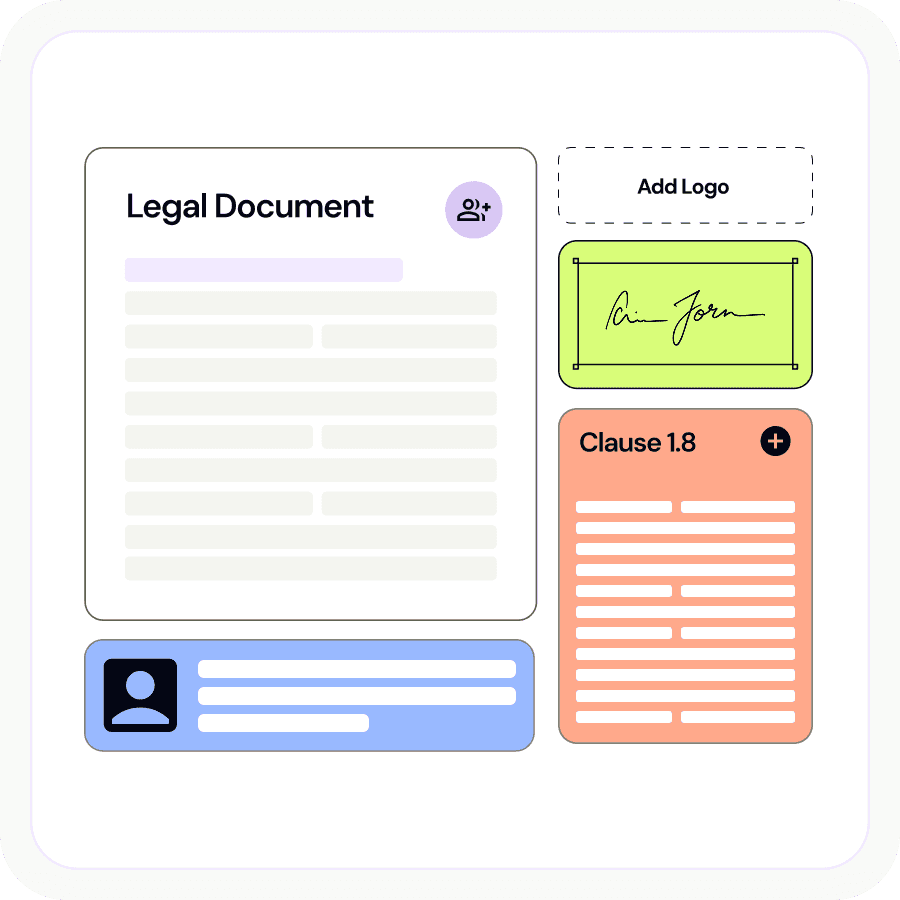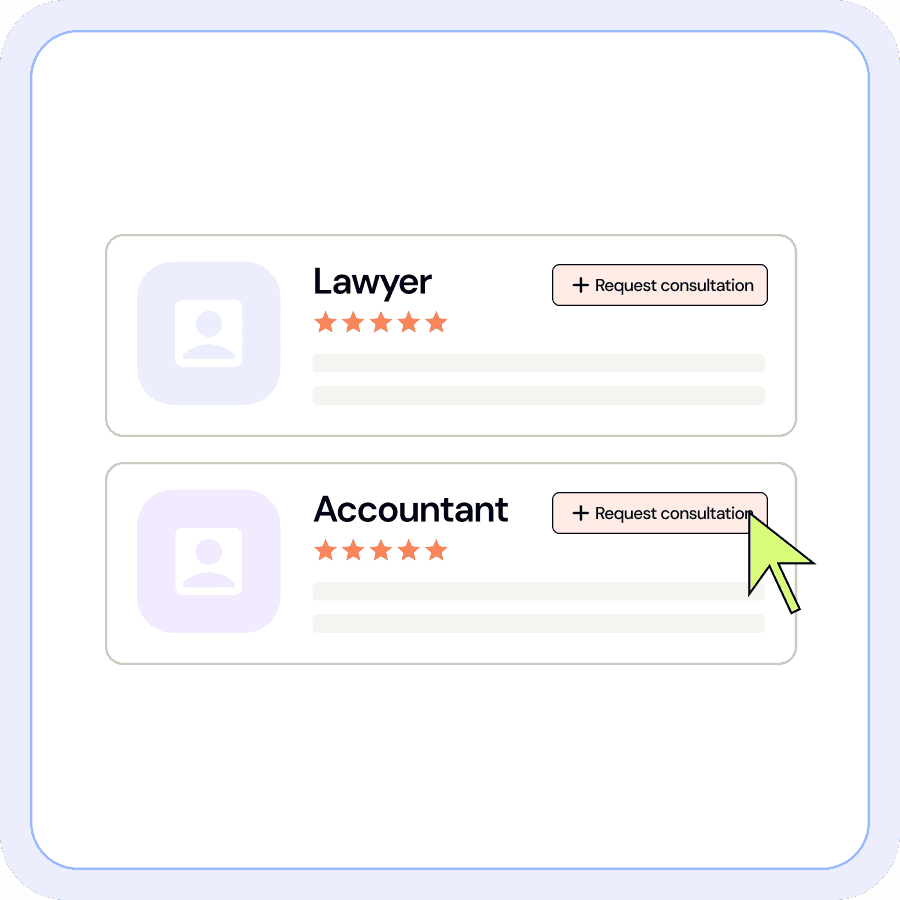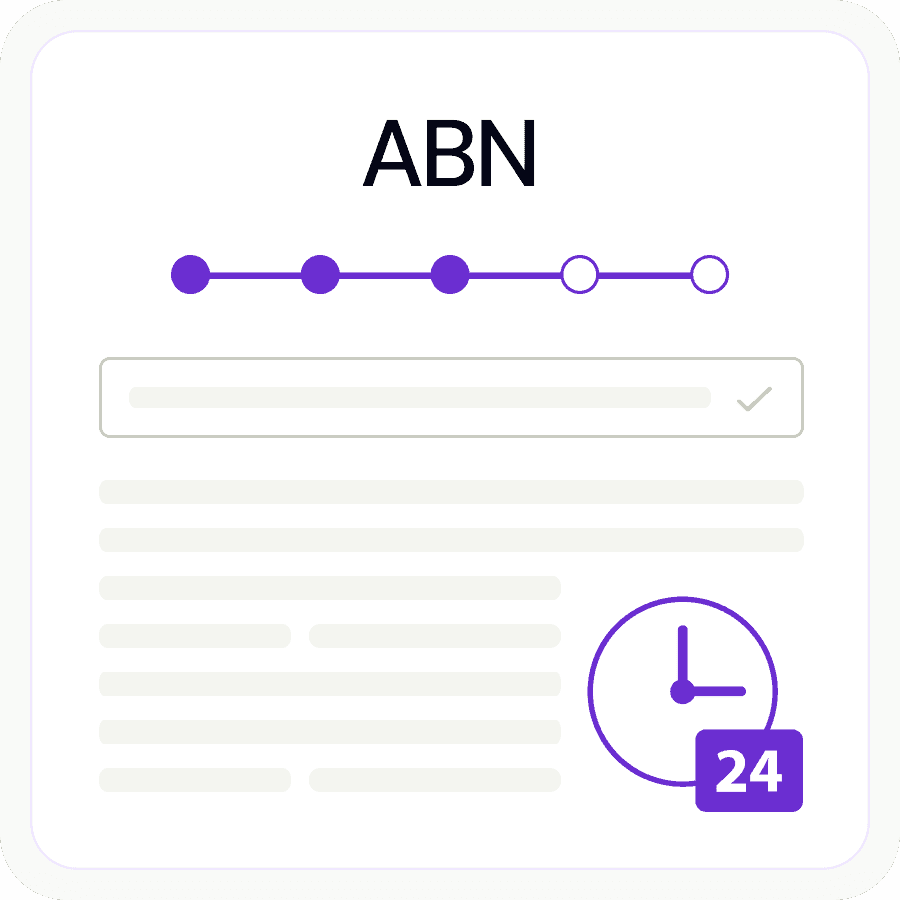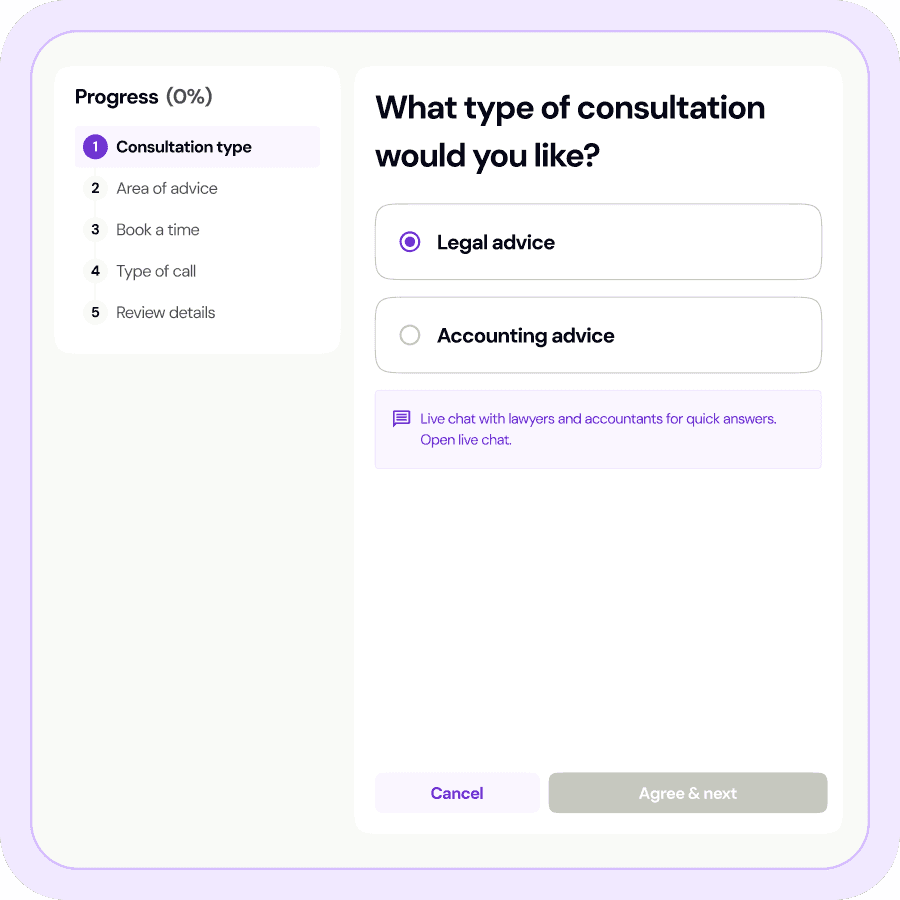Back in the day, The Young & the Restless was a soap opera playing out in lounge rooms across the world. Today, the title feels like it belongs to a different kind of storyline, one unfolding in our business registries.
More and more, the people starting companies aren’t seasoned professionals with decades behind them. They are fresh out of uni. They are in their first jobs. Some are barely old enough to rent a car. And yet they are signing the papers, registering ABNs, and deciding that now, not later, is the time to build.
The Lawpath Business Index has been tracking this shift, and the signals are clear. The startup scene is getting younger. The question is what is driving it. Is it culture, economics, or simply a generation unwilling to wait their turn?
Table of Contents
Age distribution of founders in Australia
When we look at the numbers, a clear pattern emerges in the age distribution of founders. The youngest group — those aged 18 to 24 — now account for 6.2% of new registrations. That may sound small, but it represents a 62% jump compared with the same time last year, making them the sharpest risers by far.
Just above them, individuals aged 25 to 29 hold a 6.5% share of new businesses. Their growth is steadier at 16% year-over-year, but combined with the younger group, they demonstrate that founders under 30 are no longer an outlier. They are a growing force.
By contrast, the story changes as we move into the thirties. Founders aged 30 to 34 make up 7% of the pool, but their numbers have fallen by 13% over the year. The next band, comprising 35- to 39-year-olds, is larger again, at 10%, and still growing, up 9% year-over-year.
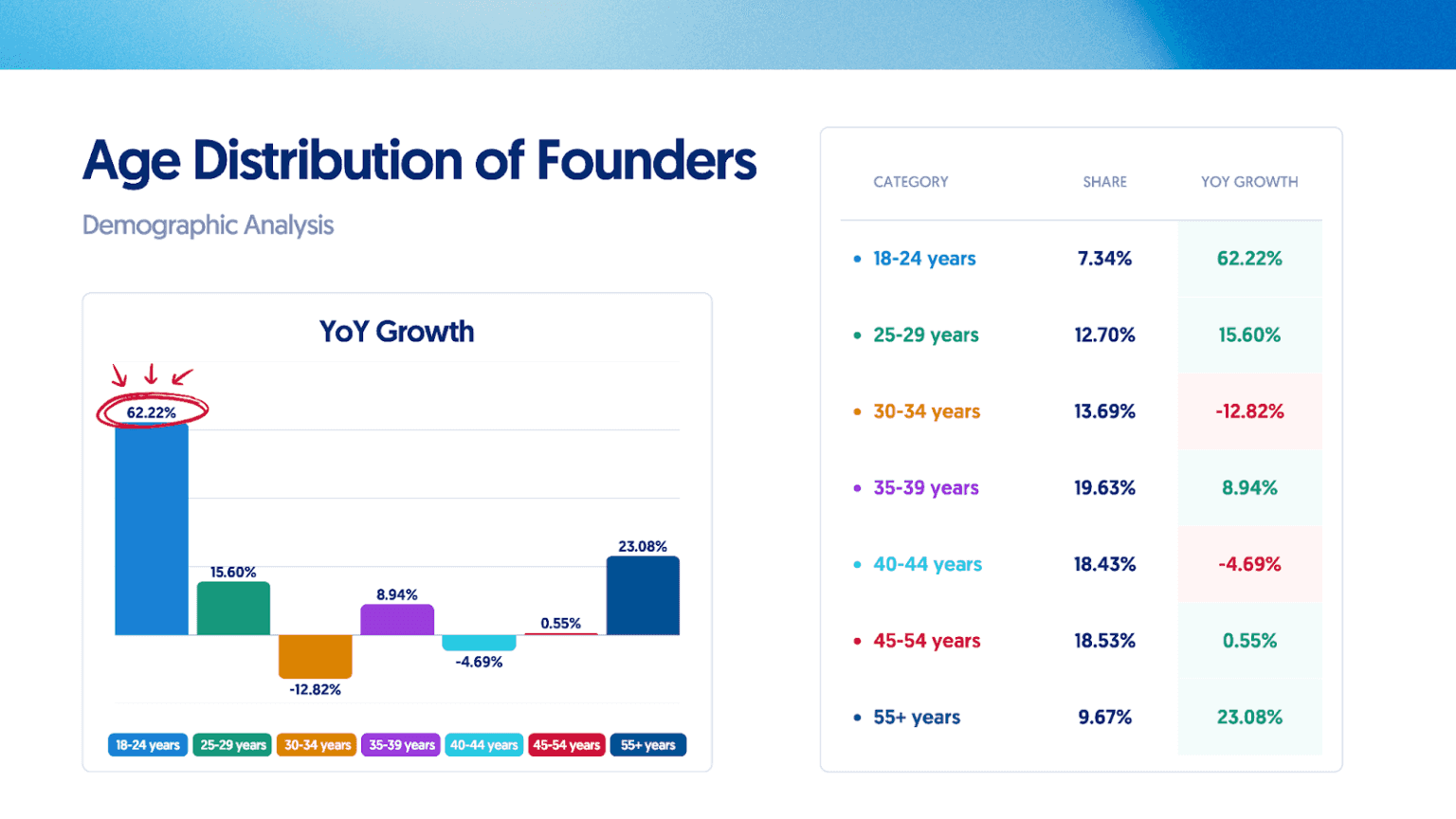
Taken together, this suggests something about the demographics of startups in Australia. The energy is shifting to the youngest end of the spectrum, while mid-career founders are slowing or holding steady. It is not yet a changing of the guard, but the first signs of one are here.
Why are younger founders on the rise?
Every generation works differently, but Gen Z is doing more than just rewriting the script. They are starting the story earlier.
These are what we have observed in wider surveys, and they echo what the Lawpath Business Index is now surfacing in the data, which is that business ownership is no longer something you wait until your thirties or forties to try.
Cultural factors
The Hatch Hotlist survey found that 80% of young Australians either have a side hustle or want one. For many, entrepreneurship is less about chasing a big payday and more about independence and identity.
A MYOB study echoed this, showing that three in four Gen Z would consider starting their own business, with the top reasons being to “be my own boss” and to “escape the 9-to-5.” This is the creator economy mindset at work — businesses born from hobbies, content, or projects that once stayed on the side now take centre stage.
Economic factors
The backdrop matters too. A 2023 ASIC’s national survey with YouGov showed that 77% of Gen Z feel the weight of cost-of-living pressures, more than any other age group. Many already juggle extra jobs or debt, and starting a business is as much about security as it is about opportunity.
Add to that the rise of AI and low-cost digital platforms, and suddenly the barriers that once made entrepreneurship feel out of reach have collapsed. A laptop and some drive can go a long way.
Education and exposure
This generation also grows up surrounded by role models and programs designed to help them try earlier. Startup hubs at universities, accelerator programs, and mentoring initiatives mean that entrepreneurship is an option before graduation.
And big stories, like Canva and Airtasker, have shown that global-scale companies can be built from Australia, often by people who started young themselves.
Deloitte’s Gen Z and Millennial Survey confirms the pattern; young people are more likely to measure success by purpose and growth than by title or tenure.
Taken together, these cultural, economic, and educational shifts explain why the age of founders is trending downward. And they align with what we see in the Index itself, that the youngest groups are no longer waiting their turn, they are stepping in now.
How younger founders compare to older cohorts
According to the data, the largest share of new business registrations still comes from individuals in their thirties. Founders aged 30 to 39 make up almost one in five new ventures, and they remain the steady backbone of Australia’s startup boom.
Their advantage is obvious — more time in the workforce, more savings to draw on, and networks built over a decade or more.
But the real momentum sits with the under-30 founders. Together, the 18- to 24-year-old and 25- to 29-year-old age groups now hold just over 12% of the pool. That may seem small beside the mid-career share, but their growth is unmatched. In the last year alone, applications from the youngest group jumped 62%.
This is where the story links back to what we’ve already seen. Younger founders are testing ideas, turning side hustles into full-fledged companies, and taking the lead earlier than their predecessors. Older cohorts bring stability, but it is the energy of the under-30s that is shaping what comes next.
If these trends continue, the next decade could mark a handover. What is today a youth-led surge on the edges may soon become the main storyline of business creation in Australia.
Joining the dots: what this says about Australia’s startup culture
When we place the rise of younger founders alongside other signals in the Lawpath Business Index, a bigger picture of startup culture in Australia starts to appear.
We’ve already seen how entrepreneurial surnames are shifting. Names like Singh, Nguyen, and Kaur are climbing the charts, reflecting migration patterns and the diverse communities now driving new businesses. Layer that with the age story, and it’s clear that many of the new founders stepping forward are not just younger, but also more culturally varied than ever before.
We’ve also tracked a dip in GST registrations, suggesting that more businesses are starting lean. This lines up neatly with what’s happening among the under-30 cohort. Many are choosing to build first, test their ideas, and only formalise tax obligations once the business has its footing.
Put together, these threads tell a simple story. Startup culture in Australia is not just growing in size, it’s changing in shape. Demographic shifts, cultural influences, and new ways of starting lean are all reshaping who becomes a founder. And the signs suggest the next chapter will be written by younger, more diverse, and more ambitious entrepreneurs than ever before.
Young & restless, but here to stay
The data makes one thing clear. Youth founders are still a minority, but they are the fastest-growing part of Australia’s business community. What was once considered too early (starting a company before the age of thirty) is now becoming increasingly common.
This shift is being fuelled by early ambition, digital tools that lower the barriers to entry, and a culture that embraces side hustles and new ideas. Together, these forces point to a long-term trend (not just a momentary spike).
For those ready to join the movement, the first step is to formalise your startup journey. Lawpath can help you register your ABN or ACN, set up the right structure, and access the legal documents you need to start with confidence. Sign up for free, and we can help you get there.



